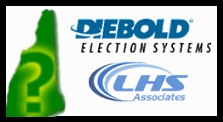Special to The BRAD BLOG by Dori Smith of Talk Nation Radio
http://www.bradblog.com/?p=5553#more-5553
Early research into New Hampshire wards and towns which used Diebold's AccuVote Optical-Scan voting machines during last week's Primary reveals that chronic problems continue with the company's infamous paper-ballot voting machines.As well, the preliminary investigation reveals a great deal of confusion and conflicting information from local election clerks and a high-ranking official in the state Attorney General's office regarding protocols and security procedures for voting systems and memory cards, and how they are to be handled during Election Day failures.
All four counties I contacted on January 10th that had used Diebold's electronic machines last week reported problems during the election with the machines. Two other calls that same day turned out to have been to areas where electronic voting is not in use, where hand counts are done instead. If the small sampling is any indication, a statewide study would likely reveal that voting machines failed many times during the 2008 Presidential Primary across the entire state.
Problems with the systems were quickly revealed during all of my calls to officials who had used the optical-scan systems in Hanover, Exeter, Nashua, and Manchester.
"LHS provides back-up memory cards. But if a memory card failure were to occur during the election...they bring you another one, you just put it in. There's no problem." - Exeter, NH, Town Clerk Linda Hartson
Little reporting or inquiry into such problems has been done so far by the mainstream media. Reports of machine failures in Stratham, leading to hand counting of votes after a "glitch" was discovered in the optical-scan systems used there, were buried in a local article on Primary results in SeaCrestOnline on Thursday. The bulk of media reporting on the anomalous results from the election has focused, instead, on speculation as to what might have gone wrong with pre-election polls. Little if any coverage has been given to whether the results themselves were correct as reported, or whether voting machine errors or tampering may have occurred.
The paper ballots cast by 80% of the state's voters have never been examined by anyone to determine the mechanical vote-counting accuracy. The computer counting of those ballots is overseen by a single, private company which is routinely granted extraordinary access to the systems, and interviews with a number of state officials indicate they all seem to have different understandings of what, if any, rules exist to regulate that access...
LHS Associates of Methuen, MA, the private vendor which handles all programming, sales, and service for the Diebold voting machines, oversees the tabulation of those 80% of ballots cast last week. The company is heavily relied on by town officials across the Granite State. The officials trust the company, and their representatives are relied upon to step in to take care of crucial voting machine problems which crop up during elections. They are like copy machine repair staff in a frantic law office. Little would move without them.
Yet access to such systems, and their vulnerable memory cards, has been revealed as particularly dangerous by numerous independent academic and state studies over the last several years, all of which have shown that elections can be tampered with, and results manipulated, via such access.
If a statewide recount of New Hampshire, as requested by Democratic candidate Dennis Kucinich and little-known Republican candidate Albert Howard, proceeds as currently scheduled [PDF] to begin on January 16th, any irregularities revealed could be cross-referenced to towns where machines failed. However, whether irregularities are discovered or not, voting machine failures need to be compiled.
No such compilation of Election Day problems with Diebold voting machines has so far occurred in New Hampshire, to my knowledge. Such data, combined with a top-down investigation into the performance of all electronic voting machines in general, could help to make the 2008 Presidential Election far more secure.
Of interest would be the number of times that voting machines and vulnerable memory cards were repaired, replaced, or in any way handled by town officials or LHS Associates, a company which, as I've reported previously, has a less than stellar reputation and, frequently, little regard for local election laws.
Additionally, new information concerning the criminal background of a senior LHS executive has also recently been unearthed, adding to concerns about the company which has nearly complete control over every aspect of 80% of New Hampshire's votes. It is unclear whether the New Hampshire Secretary of State or those of any of the other states across New England --- where LHS also serves as Diebold's sole vendor and service provider --- are aware of that particular aspect of the company's background.
Last-minute repairs and replacements made to voting machines by LHS in advance of, or during, elections are prime opportunities for fraud, a time when the systems are in their most vulnerable state. A now-infamous hack of the exact same machine used last week across New Hampshire in its Primary was seen in HBO's Hacking Democracy (video of hack here). The hack in Leon County, Florida, in late 2005, is seen as completely flipping the results of a mock election such that only a manual hand-count of the paper ballots would reveal the tampering that had been done to the system's memory cards.
(Note: You can view every article as one long page if you sign up as an Advocate Member, or higher).





